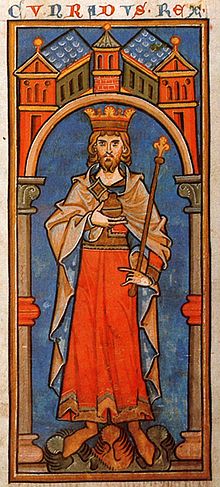Conrad III of Germany
| Conrad III | |
|---|---|

King Conrad III (Cunradus rex) in a 13th-century miniature from the Chronica sancti Pantaleonis
|
|
|
King of Germany (formally King of the Romans) |
|
| Reign | 1138–1152 |
| Coronation | 13 March 1138, Aachen |
| Predecessor | Lothair III |
| Successor | Frederick I |
| King of Italy | |
| Reign | 1128–1135 |
| Coronation | 1128, Milan |
| Predecessor | Henry V |
| Successor | Frederick I |
| Born | 1093 |
| Died | 15 February 1152 Bamberg, Bavaria |
| Spouse |
Gertrude of Comburg Gertrude of Sulzbach |
| Issue |
Henry Berengar Frederick IV, Duke of Swabia |
| Father | Frederick I, Duke of Swabia |
| Mother | Agnes |
| Religion | Roman Catholicism |
Conrad III (1093 – 15 February 1152) was the first King of Germany of the Hohenstaufen dynasty. He was the son of Duke Frederick I of Swabia and Agnes, a daughter of the Salian Emperor Henry IV.
The origin of the House of Hohenstaufen in the Duchy of Swabia has not been conclusively established. Conrad's great-grandfather Frederick of Staufen was count in the Riesgau and in 1053 became Swabian Count palatine, his son Frederick of Buren probably resided near present-day Wäschenbeuren and about 1050 married Countess Hildegard of Egisheim-Dagsburg from Alsace.
Conrad's father took advantage of the conflict between King Henry IV of Germany and the Swabian duke Rudolf of Rheinfelden during the Investiture Controversy. When Rudolf had himself elected German anti-king at Forchheim in 1077, Frederick of Hohenstaufen remained loyal to the royal crown and in 1079 was vested with the Duchy of Swabia by Henry IV, including an engagement with the king's minor daughter Agnes. He died in 1105, leaving two sons, Conrad and his elder brother Frederick II, who inherited the Swabian ducal title. Their mother entered into a second marriage with Babenberg margrave Leopold III of Austria.
In 1105 Henry IV, Holy Roman Emperor since 1084, was overthrown by his son Henry V, Conrad's uncle. Emperor since 1111, Henry V preparing for his second campaign to Italy upon the death of Margravine Matilda of Tuscany, in 1116 appointed Conrad a Duke of Franconia. Conrad was marked out to act as regent for Germany, together with his elder brother, Duke Frederick II of Swabia. At the death of Henry V in 1125, Conrad unsuccessfully supported Frederick II for the kingship of Germany. Frederick was placed under a ban and Conrad was deprived of Franconia and the Kingdom of Burgundy, of which he was rector. With the support of the imperial cities, Swabia, and the Duchy of Austria, Conrad was elected anti-king at Nuremberg in December 1127.
...
Wikipedia
